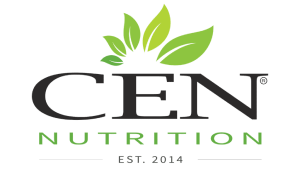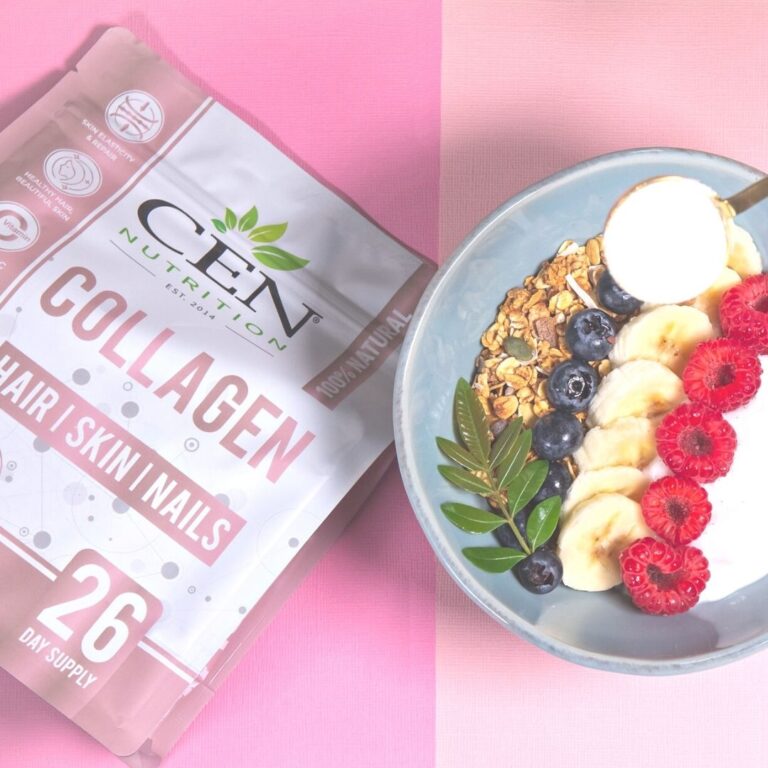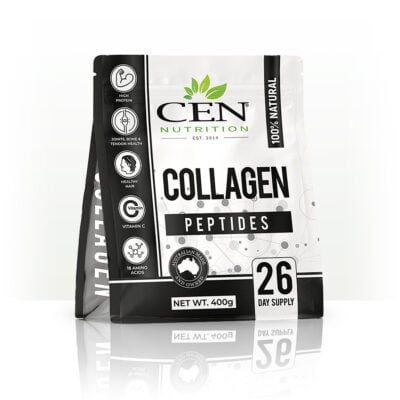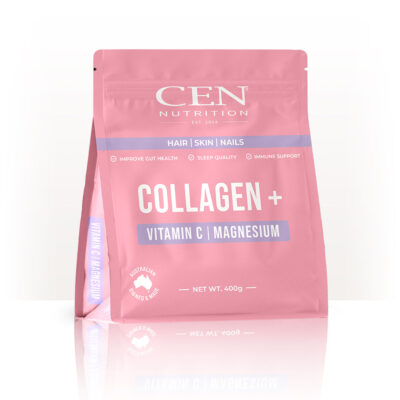WHAT IS COLLAGEN?
Collagen has become a keystone supplement in the management of the ageing process.
Collagen is a structural protein and the most abundant protein in our bodies, but we naturally start to lose collagen as we age. At some point when we are over 20 years of age, there is a gradual decline of natural collagen in the body. Other effects of collagen loss in our bodies include processed foods, stress, trauma, nutritional deficits, dehydration, hormonal changes, drugs, alcohol.
One of the best sources of collagen is from bovine which is a naturally occurring protein found in the cartilage, bones and hides of cows, which provides types I and III collagen. These two types are the major components in humans including skin, hair, nails, muscles, tendons, ligaments, bones, eyes and blood vessels.
Other benefits of collagen in the diet have been shown to help support muscle mass and strength, help in conditions such as osteoarthritis, improve gut health, repair tissue, promote deeper sleep and improve skin quality.
All forms of collagen are good for your health, but the absorption rate of hydrolyzed collagen is over 90 percent compared to less than 30% in food sources of collagen.
COLLAGEN FOR SKIN HEALTH
Collagen is produced naturally in the skin which is present mainly in the dermis layer of the skin. Therefore collagen is beneficial to help improve skin health especially appearance.
Type I is the main collagen found in skin, representing up to 90% of skin collagen. It is produced by cells called fibroblasts, found predominantly in the dermis layer. Fibroblasts also produce elastin protein which gives skin the flexibility to stretch and is responsible for the structure of skin to resume its shape after stretching.
So in summary, Collagen is responsible for strength and elastin for elasticity to the skin. Production and density of both decreases as we age, which gives the sagging and wrinkling appearance in skin. Ensuring enough collagen is present in the diet to help improve skin health.
COLLAGEN IN BODY STRUCTURE
One of the primary roles of collagen in the human body is mechanical support. It is the framework for bone cells and approx. 90% of their total collagen is Type 1 collagen. This type is in bone tissue and forms the polypeptide triple helices which create the collagen fibrils. Daily collagen supplements can help bone density and also helping the body produce new bone.
Collagen is an abundant structural protein found in various connective tissues. These structures include cartilage, tendons, ligaments and skin.
Studies have shown that collagen is also helpful in regeneration and repair of ruptured muscle fibers with the production of connective scar tissue. Type 3 synthesis reached more in the starting period of wound healing and type 1 collagen formation began later on in the process of wound healing it basically gives the strength to newly form fibers and connective tissues.
Collagen protein has 18 amino acids present which is very helpful in repair and recovery of muscle or any muscle injuries. Collagen protein may help joint pain resulting from high intensity sports or high impact activities. It can also help the improve the performance of athletes as the levels of glycine and arginine it contains, supports the synthesis of creatine in athletes, which is responsible for short bursts of muscle contraction.
-
Rated 5.00 out of 5$49.95 inc. GST Select Options This product has multiple variants. The options may be chosen on the product page
-
Rated 5.00 out of 5$49.95 inc. GST Select Options This product has multiple variants. The options may be chosen on the product page
COLLAGEN IN NAIL & HAIR HEALTH
Keratin is most abundantly found in hair thus deficiency of it may affect hair growth and health. The main amino acid which is present in keratin is proline and this particular proline is readily available or found in collagen.
Up to 70% collagen is located in the dermis layer of skin and this provides a rich environment to help increase the health of the papilla. The papilla is where the hair follicle starts its life cycle. Increasing the nutrition through collagen in the most influential stage of growth may assist in the reduction of hair loss.
Type I and III collagen may help support nail growth and maintenance. This can provide strength and help prevent brittleness. Nail health can indicate good overall health with sufficient collagen production in the body.
COLLAGEN IN DIGESTIVE HEALTH
Research has also found that collagen is helpful in gut health. With digestive problems there are certain amino acids in collagen like glutamate that improves gut health support and helps neutralise oxidative stress in the intestine and acts as fuel source. It helps soothe, repair and strengthen the digestive tract with the amino acid profile that is essential for repair. Furthermore, the research has shown collagen peptides can improve the tight junctions and help the gut barriers if dysfunctional.
COLLAGEN FOR BLOOD VESSEL HEALTH
Also collagen plays a main role in blood vessels to maintain healthy structure as we know it is important for elasticity in skin the same way it is important to give strength, flexibility with the vessel which in turn helps in proper blood flow. High blood pressure, clotting of blood, atherosclerosis and other blood vessel related problems can be helped with collagen supplementation.
HOW MUCH COLLAGEN IS REQUIRED
Studies conducted on bovine collagen peptides show the best serving size is approx. 15g each day for optimal absorption and utilisation in the body. CEN Collagen is sourced from high quality bovine collagen in the form of hydrolysed collagen peptides for best absorption.
Written by
Bryan Meggitt (BMedSc. PGCrtMedSc.)
Blood Scientist and Co-founder of CEN Nutrition



